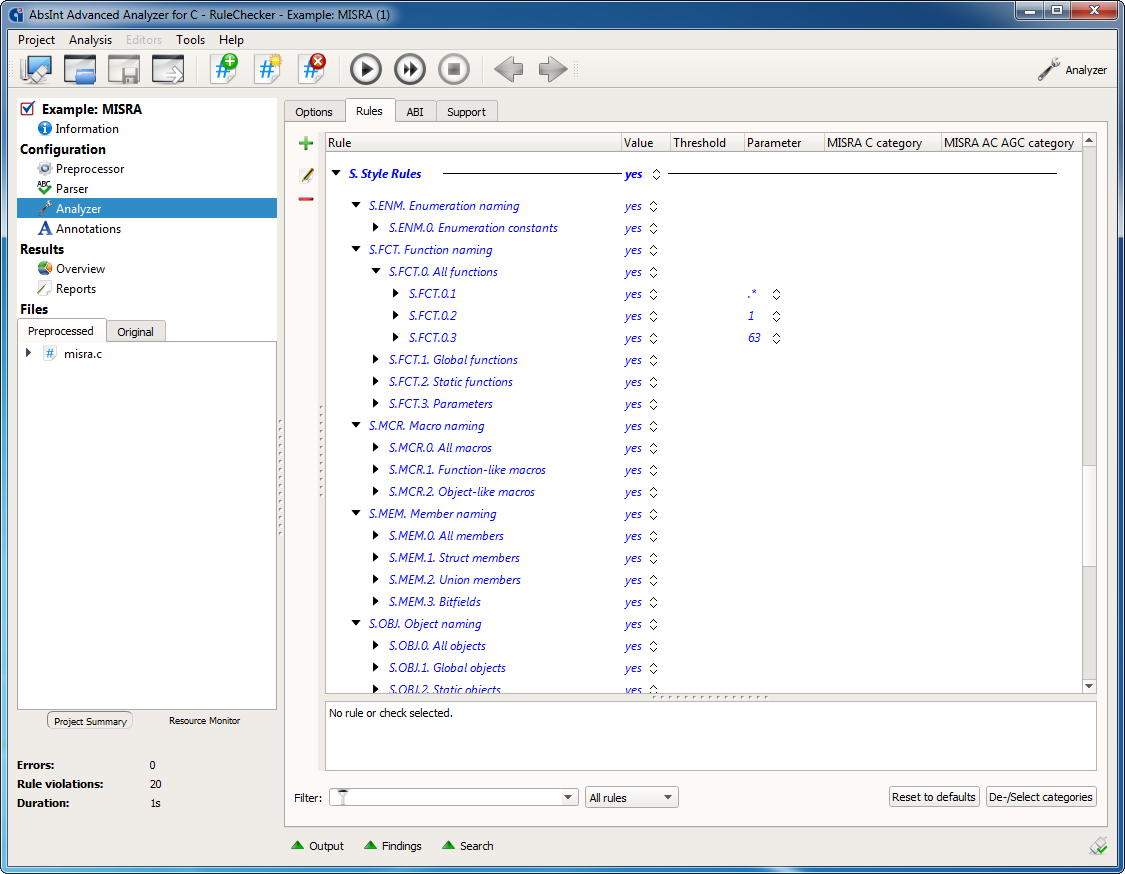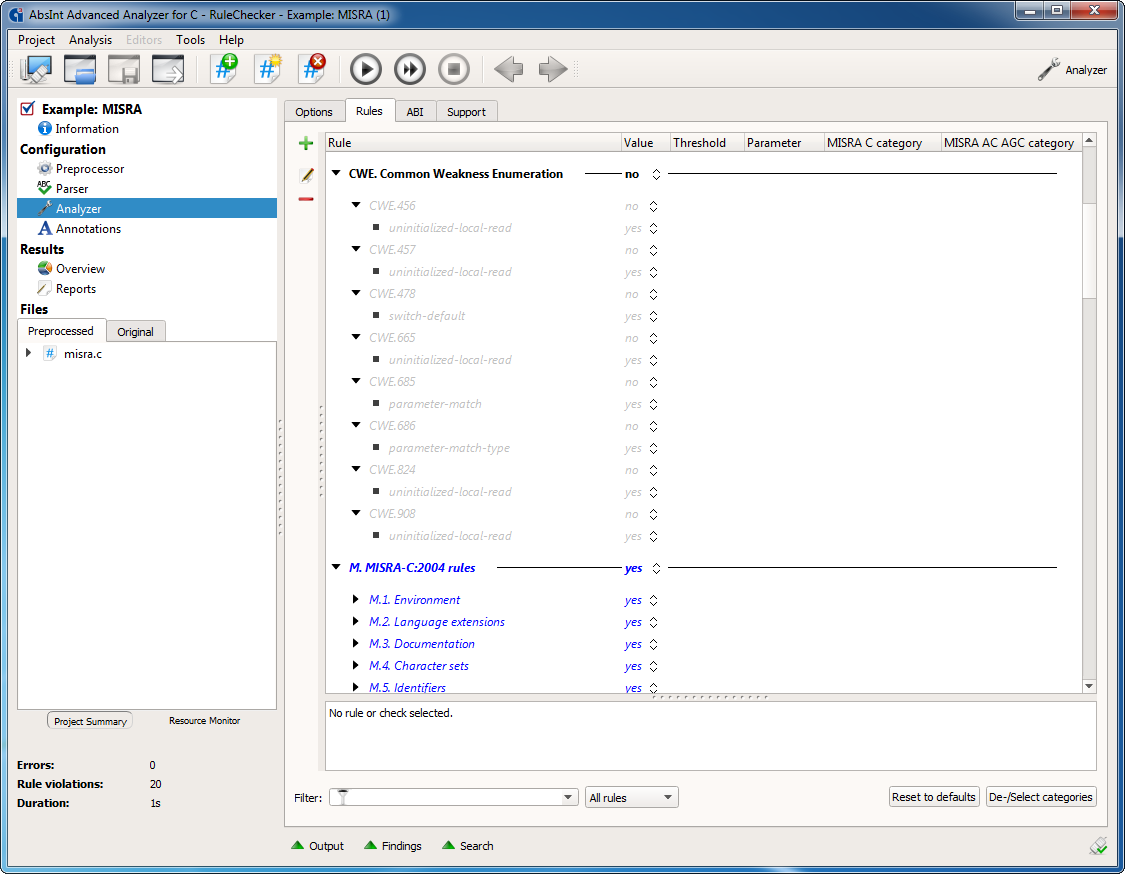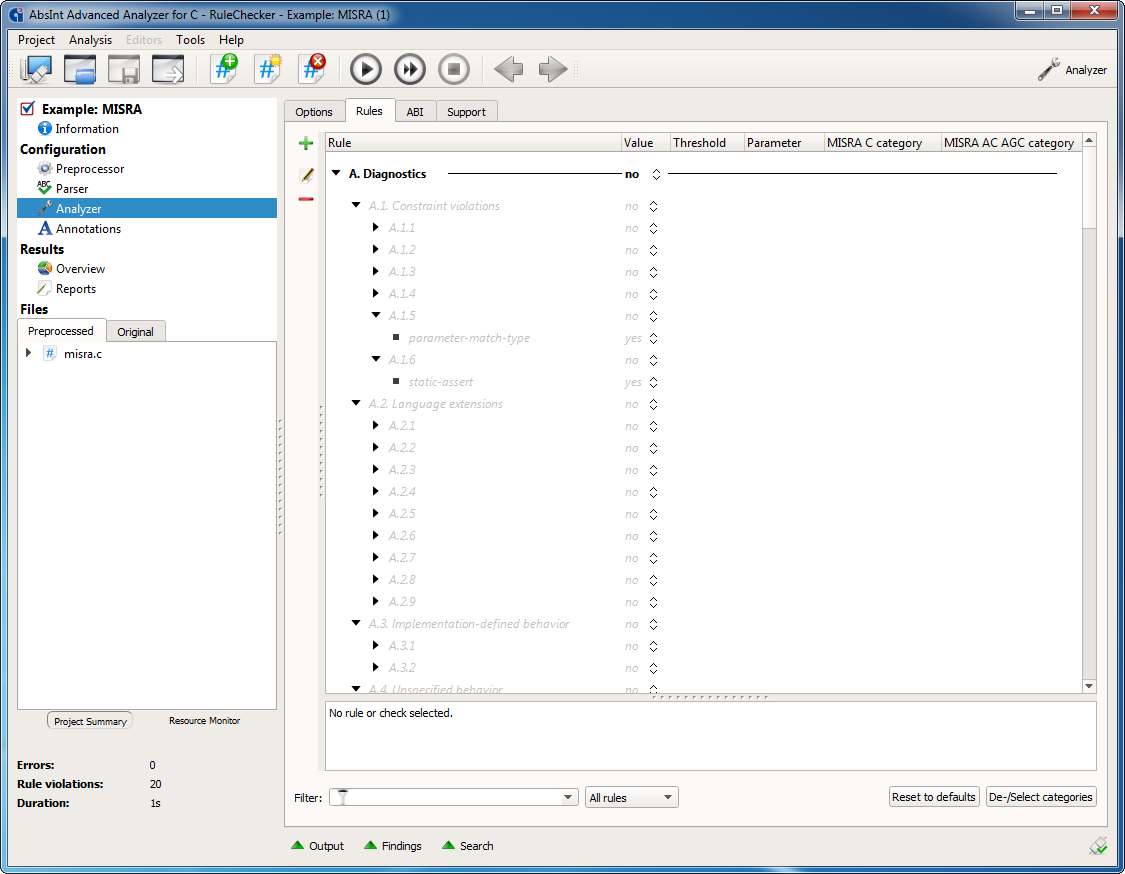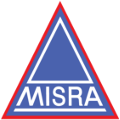
New style rules

Support for CWE guidelines

New diagnostics
Re-categorization of MISRA rules
RuleChecker now supports re-categorizing MISRA rules, e.g. using DAX:
<rulechecks>
<categories>
<M2012.7.1>mandatory</M2012.7.1>
</categories>
</rulechecks>
This re-categorization is then reported by the analyzer as
Rules:
M2012.7.1 (full: octal-constant) as mandatory
while violations of the rule are reported as
ALARM (R): check octal-constant failed (violates M2012.7.1-mandatory) at ...
Flagging automatically-generated code

RuleChecker configurations now have a flag indicating whether the files therein contain hand-written or generated code. Depending on this flag,
- messages about rule violations refer either to the “MISRA C” or the “MISRA AC AGC” category, and
- values in either the “MISRA C category” or the “MISRA AC AGC category” column can be modified to permit re-categorization (according to the rules established by MISRA).
By default the tool assumes hand-written code. In DAX, the configurations for
automatically generated code can be specified with the new attribute agc:
<rulechecks name="xxx" agc="yes">
Options
- The option
allow-signed-constant-with-unsignednow also suppresses alarms about the operands of <<, >> and ~. - The option
allow-boolean-constantsnow also suppresses alarms about equality checks (==,!=) between the essentially Boolean values and0or1.
Checks
float-comparisonnow also covers indirect (in)equality tests of the forma - b < c && b - a < c.evaluation-orderhas been split in two:evaluation-ordernow only triggers an alarm if the semantics of an expression depends on the order of evaluation of its sub-expressions. It does not consider multiple reads or writes of volatile variables.multiple-volatile-accessestriggers an alarm for an expression if there are at least two reads or two writes of a volatile object in that expression and if the checkevaluation-orderhas not triggered an alarm for it.
expression-orderhas been replaced by two checks:- the new
evaluation-ordercheck as described above, that triggers an alarm if the semantics of an expression depends on the order of evaluation of its sub-expressions - the check
evaluation-order-initializerthat triggers an alarm if the semantics of an initializer list depends on the order of evaluation of its elements.
- the new
- Double slashes within
//-style comments are no longer treated as a violation of the checksline-comment. This modification affects MISRA-C:2012 rule 3.1 and CERT rule MSC.4.
Qualification Support Kits

- 226 new test cases have been added to the RuleChecker QSK.
- Under Windows, the maximum path length limitation (as specified by Microsoft) is now checked every time a test case is loaded.
Other changes
- Alarms about rule violations now contain the essential types involved, when applicable.
For example, for the code
if (2) {}the analyzer now reports... expected essentially Boolean but is essentially signed at ...
ALARM (R): check boolean-control failed (violates M2012.14.4-required) at ... - Improved precision for pointer dereferences in the side effect analysis.
This yields fewer false alarms about violations of the checks
evaluation-orderandexpression-orderand fewer false notifications about ambiguities due to side effects in expressions or initializers.
Bug fixes
- Fixed coverage reported under
/* Active rule checks */for rules fully covered with Astrée but only partially covered by the standalone RuleChecker. - Fixed crashes that could occur on very large compilation units.
- Fixed evaluation of regular expressions for identifier name checks which in rare cases were only matched against prefixes instead of the whole identifier.
MISRA-C:2004

- Improved checks for rule 9.1, 14.1, 12.8, and 13.7 when running in standalone mode, i.e. without the Astrée analyzer.
- Astrée-intrinsic functions for modelling concurrent execution,
such as
__astree_create_process(), are no longer considered to violate the checkstatement-sideeffectused in rule 14.2. - Alarms about violations of the check
definition-duplicatefor rule 8.9 now show the locations of both involved definitions. - The new check
parameter-match-typechecks for function calls not matching the prototype of the called expression (cf. ISO/IEC 9899:1999, §6.5.2.2p2). It is used for rule 1.1 and 16.6. - Improved the checks
identifier-hiddenfor rule 5.2 andmax-localsfor rule 1.1 with respect to compound expressions (GCC extension), removing false alarms about violations of these rules. - RuleChecker now also reports violations of the checks
evaluation-orderandexpression-orderwhenever an object is modified multiple times between two sequence points. This affects rule 12.2.
for expressions that involve function designators.
- The check
shift-with-constantfor rule 12.8 now additionally warns about too-wide shifts at compound assignments using<<=or>>=. - Fixed a false alarm at the last statement in a compound expression (GCC extension) for rule 4.2.
- Fixed checks of rule 11.1 and 16.9
- The check
include-syntaxfor rule 19.3 now additionally warns about dangling tokens following the header-name token in the same line.
MISRA-C:2012

- Added support for rule 18.1.
- Improved checks for rule 2.1, 12.2, and 14.3 when running in standalone mode, i.e. without the Astrée analyzer.
- Alarms about violations of the check
definition-duplicatefor rule 8.6 now show the locations of both involved definitions. - Enum types are now classified as anonymous or named when checking coding rules. This affects rule 10.1, 10.2, 10.3, 10.4, and 10.5.
- Added the check
implicit-function-declarationto rule 1.1. - The new check
parameter-match-typechecks for function calls not matching the prototype of the called expression (cf. ISO/IEC 9899:1999, §6.5.2.2p2). It is used for rule 1.1. - Fixed a false alarm at the last statement in a compound expression (GCC extension) for rule 4.2.
- Improved the check
distinct-identifier-hiddento remove false alarms about violations of rule 5.3. - The check
identifier-unique-tagfor rule 5.7 no longer raises false alarms about forward declared tags. - RuleChecker now also reports violations of the checks
evaluation-orderandexpression-orderwhenever e an object is modified multiple times between two sequence points. This affects rule 13.2. - Macro parameters as operand of the
#operator no longer cause false alarms about violations of rule 20.7 by triggering the checkmacro-parameter-unparenthesized-expression. - RuleChecker now also warns about violations of rule 10.3 for initializers in which the initialized (sub-)object is of floating-point type.
- The check
essential-shift-width-constantfor rule 12.2 now additionally warns about too-wide shifts:- if the left-hand operand is of essentially character type
- at compound assignments using
<<=or>>=
- The check
include-syntaxfor rule 20.3 now additionally warns about dangling tokens following the header-name token in the same line. - Fixed false alarm for rule 8.3 in case of forward-declared struct tags.
- Fixed checks of rule 11.1 for expressions that involve function designators.
- Double slashes within
//-style comments are no longer treated as a violation of the checksline-comment, which affects rule 3.1.
CWE
RuleChecker now supports the CWE (Common Weakness Enumeration) guidelines.
SEI CERT C
Double slashes within //-style comments are no longer treated
as a violation of the check sline-comment, which affects rule MSC.4.
Diagnostics
- New rules:
- A.1.5 warns about function calls not matching the prototype
of the called expression (cf. ISO/IEC 9899:1999, §6.5.2.2p2) using the new check
parameter-match-type. - A.1.6 warns about
_Static_assertdeclarations that cannot be proven to hold. - A.2.2: Assembler code shall be avoided.
- A.2.3: Absolute addresses shall be avoided.
- A.2.4: Only strictly conforming constant expressions shall be used.
- A.2.5: Enums shall not be forward-declared.
- A.2.6: Lvalue casts shall be avoided.
- A.2.7: Non-standard keywords shall not be used.
- A.2.8: Pointer attributes shall be avoided.
- A.2.9: Statement expressions shall be avoided.
- A.1.5 warns about function calls not matching the prototype
of the called expression (cf. ISO/IEC 9899:1999, §6.5.2.2p2) using the new check
- Rule A.3.2 now warns about the use of multi-character char constants.
Style rules
Many additional rules have been added that cover the naming of all C identifiers. These rules are nested by identifier namespace, scope or similar.
- For each kind of identifier, there are configurable rules for length
and spelling, using regular expressions. If available, the regular expressions can use
the patterns
%Filename%,%Folder###%,%bitsize%and%Type%to refer to the name of the current file, the###-th parent folder of the current file, the bitsize of the entity’s type or the type itself. - The string used for
%Type%can be configured via the optiontype-abbreviations. - The part of the filename which is used for
%Filename%can be configured via the optionfile-name-modifier.
Customer-specific rules
- Rule X.A.3.7 now supports UTF-8 and ISO-8859-1 encoded files.
- Improved the check
identifier-hiddenfor rule X.A.5.14 with respect to compound expressions (GCC extension), removing false alarms about violations of this rule. - RuleChecker now also reports violations of the checks
evaluation-orderandexpression-orderwhenever an object is modified multiple times between two sequence points. This affects the customer-specific rule X.A.5.34. - Fixed checks for rule X.A.5.57 for expressions that involve function designators.
- The check
shift-with-constantfor rule X.A.5.39 now also warns about too-wide shifts at compound assignments using<<=or>>=.
Code metrics
Fixed the display of metric values in messages about violation of thresholds for cyclomatic complexity and nesting of control structures. The messages now show the exact value computed by the analyzer.